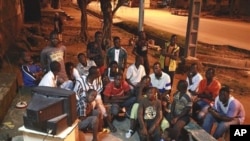An Ivoirian official told VOA the people of Ivory Coast will have an opportunity to witness a live debate between President Laurent Gbagbo and his main challenger, former Prime Minister Alassane Ouattara Thursday ahead of Sunday’s run-off election.
Lambert Bahi Serry, special adviser to Mr. Gbagbo, said the performance of the two presidential candidates in Thursday’s debate could determine who wins the election.
“The purpose of this debate is for the candidates to explain to the nation, and eventually to the international community, what they can do when they come into office. So, it’s always a tradition and this tradition is always a key aspect of modern democracy,” said Serry.
“So, this evening, President Gbagbo and Prime Minister Alassane Ouattara will be facing the nation in a debate which will last (for) an hour and 15 minutes.”
Analysts say the live debate, which is scheduled to be broadcast on both television and radio stations across the country, will help Ivoirians decide the best qualified candidate to resolve the country’s problems.
Civil society groups and religious organizations expressed concern that ongoing verbal attacks between Mr. Gbagbo and Ouattara could lead to violence. But, Serry dismissed this as ill-advised.
“In Africa, when there is an election, there is always the tendency for some of the international media to focus on some attacks. I did not see that this is going to lead to violence. The tone (of the debate) will be courteous and will be direct, and the people will find out from this debate who has a better project for the nation (and) whom they can trust.”
Mr. Gbagbo led the first round of polling with 38 percent of the votes, dominating the country's eastern, western and southern regions. Ouattara came in second with 32 percent, with support concentrated in the north.
The election now hinges on winning over the 25 percent of voters who backed the third-place candidate, former president Henri Konan Bedie, whose supporters are concentrated in the center of the country.
The runoff will mark the end of Ivory Coast's first presidential election since a 2002 civil war. The first round of balloting in late October was peaceful. President Gbagbo's term officially ended in 2005. However, new elections were repeatedly postponed because of failure to disarm rebels and disputes about voter registration.
Serry said most Ivoirians expressed satisfaction with the performance of the Independent Electoral Commission’s organization of the first round vote.




